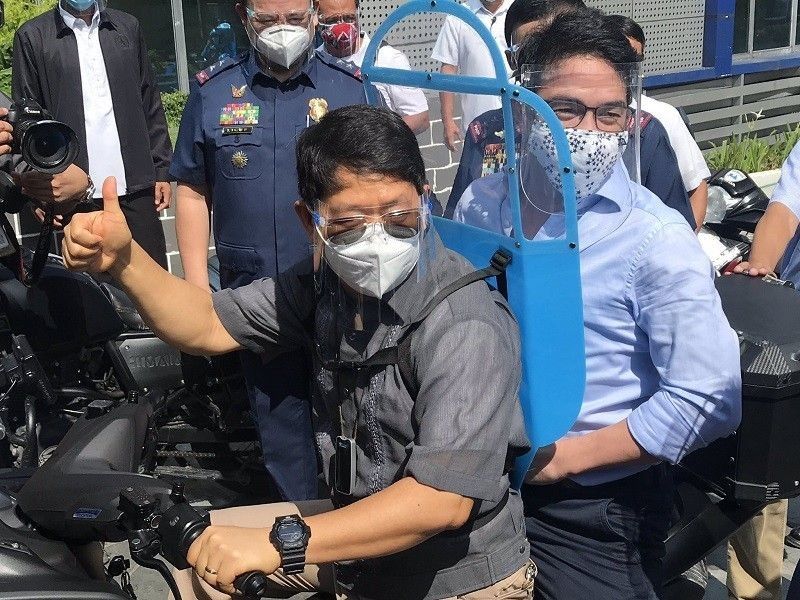Face shields, plastic barriers do little to stop COVID-19 spread — aerosol scientist

MANILA, Philippines — A debate on Twitter has revived discussions on how the coronavirus spreads and on whether plastic barriers can help prevent the transmission of the virus as talk continues of requiring face shields again.
The debate was prompted by an interview on ABS-CBN News Channel of Jose-Luis Jimenez, an aerosol expert and chemistry professor from the University of Colorado-Boulder, who said that plastic barriers and face shields do not reduce the spread of infectious diseases that undergo airborne transmission such as COVID-19.
"Face shields are outdated. At the beginning of the pandemic, we saw that when two people talk, there were some projectiles, these droplets, were flying through the air and then a face shield could intercept them," Jimenez said last week on ANC's "The Rundown".
"Now we know that's not the case. It's like smoke, and the smoke can go under the face shield. So face shields, basically, are useless except in a hospital," he added.
The aerosol expert stressed the public must use their money to buy better masks and "things that actually work."
Plastic not that fantastic vs COVID-19
The Philippines is one of the few countries that advocate the use of face shields, with the Department of Health insisting that plastic coverings provide an additional layer of protection.
Face shields are no longer required in areas under Alert Level 3 and lower. The use of face shields will be mandatory in areas under Alert Level 5.
Jimenez also said that see-through plastic barriers in schools holding in-person classes and motorcycle barriers—used to supposedly prevent COVID-19 spread—actually increase transmission.
A study from John Hopkins published in June 2021 suggested that plastic barriers in classrooms were associated with an increased risk of COVID-19 infection. A study looking at schools in Massachusetts found that plexiglass dividers with side walls were impeding air flow.
The Philippine Society of Mechanical Engineers said in 2020 that there is no guarantee that motorcycle barriers will be effective in protecting riders from the spread of air particles to each other. It also warned the barrier can compromise the stability of the motorcycle, putting riders at risk.
COVID-19 is airborne
"Airborne transmission, breathing the virus in, is the only important for of transmission. We should put there a 100% of our efforts," Jimenez stressed in the interview.
Scientists have been pointing out that there is strong evidence that SARS-CoV-2—or the virus that causes COVID-19—spreads by airborne transmission. Early in the pandemic, the researchers called on the World Health Organization to revise its recommendations.
The WHO had long held that SARS-CoV-2 is transmitted primarily through droplets when an infected person coughs, sneezes or speaks.
It took until 2021 for the United Nations health agency and the US Centers for Disease Control and Preventions to acknowledge that airborne spread is a major route of COVID-19 infection.
The WHO said that aside from droplet transmission, a person can contract the virus when infectious particles that pass through the air are inhaled at short range or if infectious particles come into direct contact with the eyes, nose, or mouth.
The virus can also spread in poorly ventilated indoor settings and in crowded areas.
People may also become infected when they touch their eyes, nose or mouth after touching surfaces or objects that have been contaminated by the virus.
On Twitter over the weekend, Jimenez had an exchange with physician Ted Herbosa about airborne transmission after the National Task Force Against COVID-19 adviser questioned the professor's expertise and warned that lab findings might not be applicable in the real world.
Well, I just lead a peer-reviewed paper that demonstrates (with epi data from real outbreaks) that superspreading is due to shared-room airborne transmission:https://t.co/K5uB26xwng
— Prof. Jose-Luis Jimenez (@jljcolorado) January 8, 2022
Jimenez also told Herbosa that airborne and aerosol transmission "are the same thing." The WHO uses two terms interchangeably for both short-range and long-range transmission.
The exchange between Jimenez and Herbosa prompted social media users to discuss airborne transmission on Spaces, Twitter's audio chat feature.
Reducing airborne transmission
The virus that causes COVID-19 is in the air. Now what?
Summary of last night’s Twitter space on #CovidisAirbornePH
— Joshua C. Agar (@JoshuaCAgar) January 10, 2022
Ten scientific reasons why Covid-19 is airborne by @trishgreenhalgh et al. (2021) in Lancet:https://t.co/NZoGrs1g6m
Below are the recommendations to reduce airborne transmissions (infographic by @mister_christer) pic.twitter.com/ubWeQZQI7z
According to experts, heating, ventilation, and air conditioning providers should use air filters to clean the air. UV lamps need to be placed near vents and away from people.
Improving ventilation is key to reducing airborne transmission. Building owners and individuals are advised to use exhaust fans to suck air out, and open windows but they need to ensure that air is coming in and out. To push air out, electric fans are preferred over ceiling fans.
The public is also advised to wear well fit and high-quality masks such as N95.
"The most effective measure we can do is do things outdoors," Jimenez said, noting the chance of getting infected outdoors is 20 times less than indoors.
Listen to the qualified scientists
Scientists also called on policy makers to work with them to design better strategies to combat the pandemic.
"I've talked to government ministers from many countries... But the problem is that they often don't listen. That's why I have to resort to Twitter," Jimenez said.
A wind dynamics expert who has been saying that face shields increase the use of transmission stressed that experts outside the medical field must be tapped for their insights.
"They need to merit and allow expert opinion coming from other fields, especially us who know face shields intervene," Joshua Agar, assistant professor at the University of the Philippines Institute of Civil Engineering, said in an interview with Philstar.com last year.
- Latest
- Trending






























